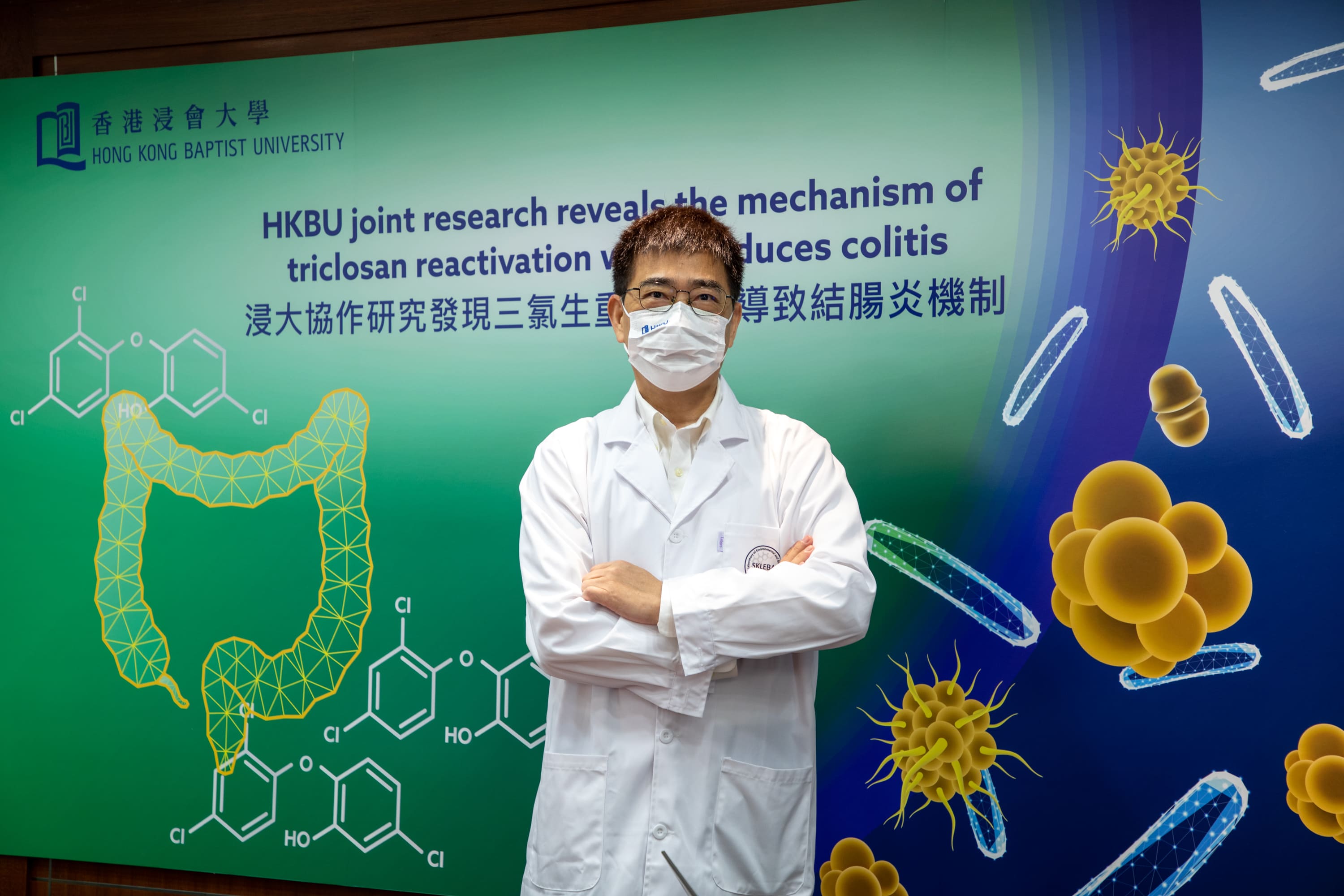Discover HKBU
Discovering the link between gut microbial enzymes and colitis
30 May 2022


We come into contact with dozens of chemicals every day, but do we fully understand the impact they may have on our health? A recent research study co-led by HKBU suggests that we still have much to learn, as it has revealed that certain gut microbial enzymes reactivate the chemical triclosan (TCS), leading to increased gut toxicity and a higher chance of developing colitis, an inflammatory condition that affects the colon.
Commonplace chemical
TCS is an antimicrobial agent that appears in consumer products such as toothpaste, cosmetics and toys. Once TCS enters the human body, it is rapidly metabolised to form the biologically inactive metabolite TCS-glucuronide (TCS-G), which is easily eliminated from the body. However, the researchers found that specific gut microbial enzymes mediate the reactivation of TCS from the inactive TCS-G, which raises gut toxicity levels and potentially triggers colitis.
The study, published in the journal Nature Communications, offers a clue to how we can prevent the development of colitis following environmental exposure to chemicals, and the authors have also suggested the need for more stringent TCS controls. Given the increasing prevalence and potentially debilitating nature of colitis, both of these aspects could make a difference to those affected by the disease.
Uncovering the molecular mechanism
Emerging research has shown that TCS exposure increases the risk of colitis, but the molecular mechanisms involved were previously unclear. To further explore the link between TCS and colitis, the researchers fed mice with food that contained TCS. After four weeks, it was found that the biologically inactive metabolite TCS-G was dominant in their liver, bile, heart and small intestine, while the colitis-inducing TCS was dominant in the gut.
The research team, which was co-led by Professor Cai Zongwei, Chair Professor of the Department of Chemistry and Director of the State Key Laboratory of Environmental and Biological Analysis at HKBU, then analysed the relationship between TCS-containing products and the concentration of TCS in the human body.
In a group of human subjects who used TCS-containing personal care products for four months, the results showed that the use of TCS-containing products led to a high level of TCS, specifically in the human gut. However, TCS and TCS-G were not detected in the control group who used TCS-free personal care products.
When the researchers delved deeper into the reasons for the high level of TCS in the gut, they discovered through a series of experiments that gut microbiota are significantly involved in the conversion of TCS-G to TCS, with two particular enzymes from the β-glucuronidase (GUS) family playing a prominent role.
These two types of GUS, namely “Loop 1” and “flavin mononucleotide-binding” GUSs, were found to be most effective at converting TCS-G to TCS, and when the research team applied a GUS inhibitor, it prevented the conversion of TCS-G to TCS. The application of the inhibitor also relieved colitis in mice.
TCS controls needed
Overall, the results support the notion that specific microbial GUS enzymes drive the conversion of TCS-G to TCS, which subsequently increases the chance of developing colitis.
Professor Cai said: “Our research results clearly defined the mechanism by which gut microbiota are involved in the metabolism and toxicology of TCS, and the study offers a way to prevent the development of colitis following environmental exposure to chemicals.
“Regulatory bodies should consider imposing more stringent controls on the use of TCS. Although the US Food and Drug Administration (FDA) banned the marketing of TCS in over-the-counter antiseptic products in 2016, the chemical remains approved for use in a wide range of products. Transparency on TCS ingredients in product labelling and illustrations should also be improved so that consumers can be aware of the potential risks and make informed choices.”